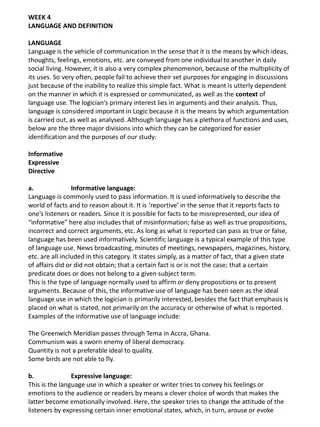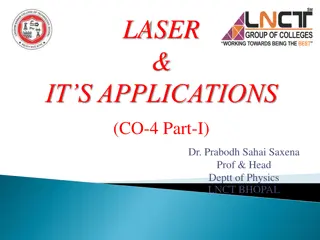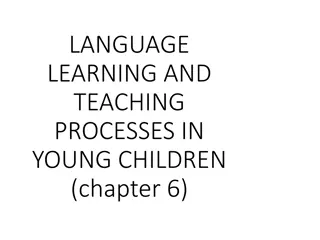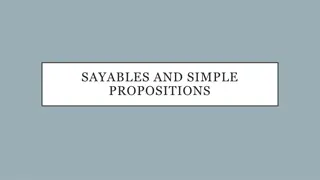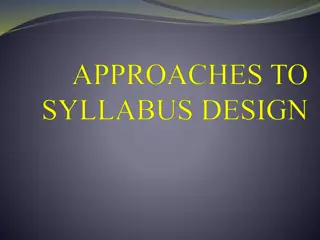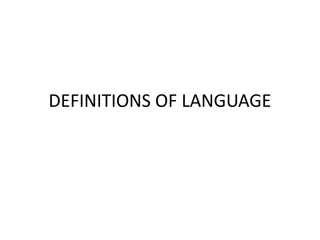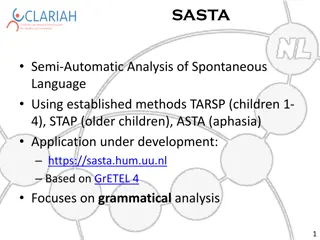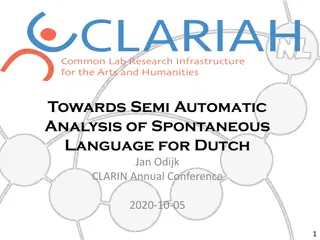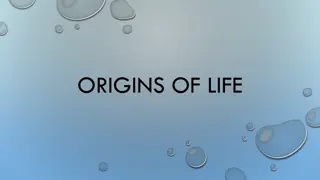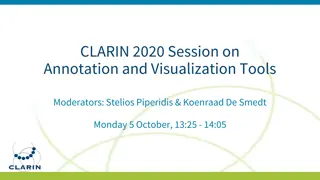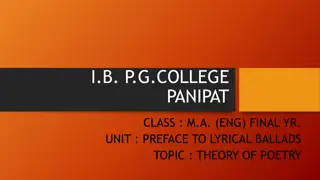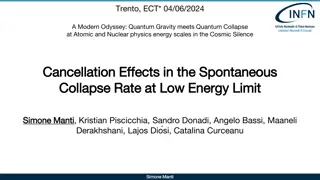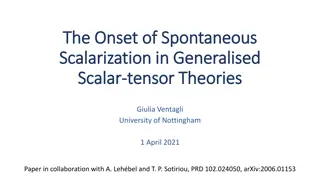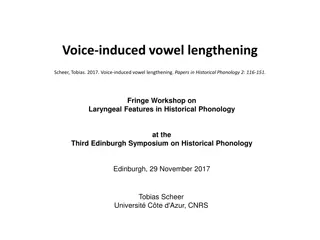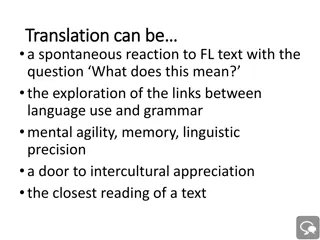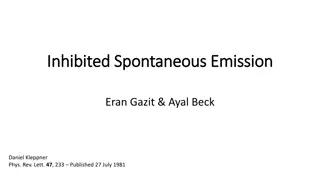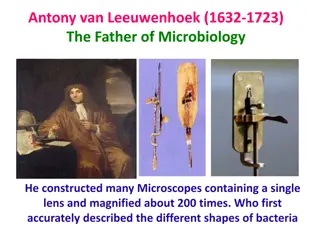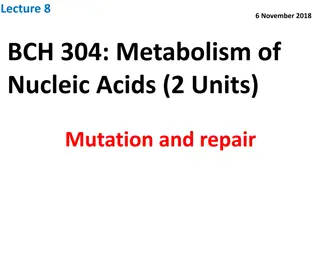Career Opportunities and Challenges in Translation & Interpreting Pedagogy Post-Pandemic
The APTIS 2022 conference explores new avenues in Translation and Interpreting (T&I) pedagogy amidst a changing landscape. Dr. Bego A. Rodriguez highlights emerging roles for T&I graduates. The context reveals a decline in language learning in the UK, impacting the Language Service Industry. The UK'
0 views • 13 slides
Language Study Community – Enhance Your Language Skills
Joining a Language Study Group is a fantastic way to take your language learning to the next level. By leveraging the power of Group Study, you can immerse yourself in the language, enhance your understanding, and build confidence in your speaking abilities. Read full article \/\/explainlearning.com
1 views • 3 slides
Academic Language Demands and Supports in Instructional Planning
Academic Language Demands and Supports are crucial in educational settings to ensure comprehension and usage of language by students. This content discusses embedding language demands in lesson plans, providing language supports, and peer review activities to enhance academic language skills. The fo
6 views • 10 slides
The Significance of Media in Language Learning
Media plays a crucial role in language learning by raising awareness of the ideology behind linguistic structures and providing valuable information on society and culture. Linguists are drawn to media language for research purposes and to understand its impact on language use and attitudes. Media s
11 views • 5 slides
Understanding Translation: Key Concepts and Definitions
Translation involves transferring written text from one language to another, while interpreting deals with oral communication. Etymologically, the term "translation" comes from Latin meaning "to carry over." It is a process of replacing an original text with another in a different language. Translat
11 views • 76 slides
Language and Communication in Society: Understanding Interactions
Explore the intricate relationship between language and society through lectures focusing on language in interaction, power dynamics, language contact and change, public space discourse, linguistic landscaping, and more. Delve into the shift from structural linguistics to societal communication, red
6 views • 28 slides
Understanding Language: Informative, Expressive, and Directive Uses
Language serves as a vital medium for communication, allowing the conveyance of ideas, thoughts, and emotions. It is a complex phenomenon with diverse uses. This text delves into the three major divisions of language use - informative, expressive, and directive. Informative language conveys facts, w
4 views • 6 slides
Clinical Update on Management of Spontaneous Intracerebral Hemorrhage
This clinical update, adapted from the 2022 guideline by the American Heart Association and American Stroke Association, covers a comprehensive range of topics related to the management of patients with spontaneous intracerebral hemorrhage. It includes information on population health implications,
0 views • 38 slides
Understanding Laser Technology: Principles, Applications, and Einstein's Coefficients
Exploring the fascinating world of lasers, this content delves into the principles governing laser technology, including the concept of stimulated emission by Einstein. It covers the characteristics of lasers, different types, and the significant contributions of pioneers in the field. The explanati
0 views • 14 slides
Language Learning and Teaching Processes in Young Children
Development of language in young children is influenced by various factors such as their cultural and linguistic environment, unique characteristics, and interactions with adults. Optimal language development requires language stimulation from the environment. Varied cultural practices impact langua
1 views • 51 slides
Understanding Language in Stoicism: Significance and Corporeality
Language in Stoicism plays a crucial role in the process of assenting to impressions by focusing on corporeality, reason, and truth. It distinguishes between the mundane vocal sounds, articulated speech, and significant language to convey meanings effectively. The significance of language lies not i
0 views • 13 slides
Understanding Language Teaching Syllabus: Integration, Theory, and Approaches
Language Teaching Syllabus involves the integration of subject matter and linguistic elements, guided by theories of language and learning. Various approaches like Grammatical, Situational, Communicative, and Analytic are used to structure syllabi. Breaking language into parts aids in sequential lea
1 views • 28 slides
Exploring Language and Communication Through a Short Film
In this lesson, students will watch a 10-minute short film titled "The Most Beautiful Thing" by Cameron Covell. They will reflect on the value of learning another language, analyze how facial expressions and body language convey emotions, and develop empathy towards those facing language barriers or
0 views • 29 slides
Various Definitions of Language Throughout Linguistic History
Different linguists and scholars have offered various definitions of language over time. Sapir (1921) emphasized language as a method of communicating ideas, emotions, and desires through voluntary symbols. Bloch and Trager (1942) focused on the social aspect of language as a system of vocal symbols
1 views • 12 slides
Enhancing Language Learning Across the Curriculum in B.Ed. 1st Year Course
Language Across the Curriculum (LAC) emphasizes that language learning should occur across all subjects, not just in language classrooms. It highlights the importance of incorporating language development into every learning activity, fostering multilingualism in schools. Language plays a crucial ro
2 views • 34 slides
Understanding Conversational Analysis: Insights into Everyday Communication
Exploring the realm of conversational analysis, this text delves into the significance of natural conversation and its role in language research. Through various approaches, such as conversational analysis and discourse analysis, researchers aim to uncover the linguistic characteristics and norms of
0 views • 24 slides
Understanding the Principle and Working of Semiconductor Lasers
Semiconductor lasers operate through absorption, spontaneous emission, and stimulated emission processes. Absorption of radiation causes electrons to jump to higher energy levels, leading to light emission. Spontaneous emission is when excited electrons return to ground state by emitting photons, wh
3 views • 17 slides
Understanding Electrochemistry: Principles and Applications
Electrochemistry is a branch of chemistry focusing on electricity generation from spontaneous chemical reactions and utilizing electrical energy for non-spontaneous transformations. It encompasses important concepts like electrolytes, electrode potential, electrochemical cells, salt bridges, and the
0 views • 20 slides
SASTA: Semi-Automatic Analysis of Spontaneous Language
Application development for linguistic analysis using established methods like TARSP, STAP, and ASTA. Focuses on grammatical analysis, comparing results to normative figures. Shows promise in linguistic assessment, with potential societal impact.
0 views • 4 slides
Semi-Automatic Analysis of Spontaneous Language for Dutch
Develop an application to semi-automatically analyze spontaneous language transcripts for Dutch, focusing on language development disorders such as aphasia. The goal is to automate the manual analysis process using language technology, with methods like TARSP, STAP, and ASTA. The SASTA application a
0 views • 39 slides
Speech and Language Developmental Milestones: A Bilingual/Multilingual Perspective
Speech and language developmental milestones are crucial for children, regardless of their home language. These milestones encompass receptive language, expressive language, pragmatics, and articulation and phonology. Understanding how a child hears and talks from birth to one year is essential, as
1 views • 23 slides
Evolutionary Journey: From Spontaneous Generation to Endosymbiont Theory
Explore the fascinating evolution of life from early beliefs in spontaneous generation to the modern Miller-Urey experiments demonstrating simple organic molecule formation. Learn about the transition to biogenesis theory, cellular evolution, and the groundbreaking endosymbiont theory proposed by Ly
1 views • 9 slides
The Evolution of Spontaneous Generation: A Scientific Journey
Explore the historical progression of the Spontaneous Generation theory through the experiments and discoveries of scientists like Redi, Spallanzani, and Pasteur. Witness the shift from the belief that living things can arise from non-living matter to the establishment of biogenesis principles. Foll
2 views • 25 slides
Innovative Tools and Approaches in Language Annotation and Visualization at CLARIN 2020
Presentations at CLARIN 2020 Session focused on annotation and visualization tools, including a neural syntax annotator for Dutch and German, exploring and visualizing Wordnet data with GermaNet Rover, named entity recognition for distant reading in ELTeC, and the semi-automatic analysis of spontane
0 views • 10 slides
Introduction to Language Technologies at Jožef Stefan International Postgraduate School
This module on Knowledge Technologies at Jožef Stefan International Postgraduate School explores various aspects of Language Technologies, including Computational Linguistics, Natural Language Processing, and Human Language Technologies. The course covers computer processing of natural language, ap
0 views • 27 slides
Engaging Team Building Activity: Spontaneous Storytelling for Connection and Cultural Appreciation
Enhance team bonding through a creative activity of spontaneous storytelling using visual prompts. Encourage understanding, respect, and appreciation for different cultures while fostering a positive attitude towards diversity. Support each other to build a cohesive narrative and enjoy the power of
0 views • 15 slides
Exploring Sociolinguistics: Language Variation and Social Factors
Sociolinguistics delves into the study of language variation influenced by social factors, examining the relationship between language and its social context. It explores various aspects like standard pronunciation, language choice, speech acts, language components, language variety, and factors suc
0 views • 73 slides
Analysis of Wordsworth's Preface to Lyrical Ballads
William Wordsworth's Preface to Lyrical Ballads serves as a manifesto for the Romantic movement, emphasizing the use of common language and the expression of emotion in poetry. Wordsworth defines poetry as the spontaneous overflow of powerful feelings, rooted in contemplation rather than mere sponta
0 views • 10 slides
How Private Charters Offer Flexibility for Spontaneous Travel Plans_
Need a last-minute getaway? Private charters offer unparalleled flexibility and luxury. Discover how these personalized journeys can turn your spontaneous travel dreams into reality.
0 views • 6 slides
Understanding Assembly Language Programming for Computing Layers
Assembly language is a low-level programming language that enables direct interaction with a computer's hardware components. This content explores the fundamentals of assembly language, the relationship between human-readable machine language and binary code, an assembly language program for multipl
0 views • 31 slides
Investigating Quantum Collapse and Spontaneous Radiation at Low Energy Scales
Delve into the realm where Quantum Gravity meets Quantum Collapse, exploring the Cosmic Silence Cancellation Effects and the Spontaneous Collapse Rate at Low Energy Limits. Models like Continuous Spontaneous Localization and Dio.si-Penrose propose solutions to the macroscopic observation challenge i
0 views • 20 slides
Understanding Language Anxiety in Foreign Language Learning and Teaching
Explore the impact of language anxiety on students and teachers in foreign language learning and teaching contexts through insights from Dr. Christina Gkonou's research. Delve into the theoretical background, implications for language education, and real-life experiences shared at the Essex Language
0 views • 25 slides
Understanding Spontaneous Scalarization in Gravitational Theories
Spontaneous scalarization presents a unique phenomenon where compact objects experience field growth triggered by tachyonic instability, leading to stable field configurations. Explored in various theories, such as Horndeski gravity and scalar Gauss-Bonnet gravity, spontaneous scalarization is studi
0 views • 18 slides
Voice-Induced Vowel Lengthening in Phonology Research
Exploring the phenomenon of voice-induced vowel lengthening, this research delves into spontaneous vs. non-spontaneous voicing patterns and the documented transmission of voicing from vowels/sonorants to voiceless obstruents. The study discusses various theories on voice transmission from sonorants/
2 views • 35 slides
Advances in Veterinary Oncology: Understanding and Treating Spontaneous Cancers in Animals
Veterinary oncology, led by Prof. David Killick, delves into the realm of spontaneous cancers in dogs, cats, and horses, mirroring the cancer evolution in humans. The field covers diagnosis through cytology and imaging to treatments like surgery, radiation, and emerging immunotherapy. University vet
0 views • 11 slides
Understanding the Art of Translation
Translation can be a spontaneous reaction to foreign language text, involving exploration of language use and grammar while enhancing mental agility, memory, and linguistic precision. It serves as a window to intercultural appreciation and aids in close readings of texts. This content explores vario
0 views • 10 slides
Exploring Inhibited Spontaneous Emission in Physics
The study delves into inhibited spontaneous emission in physics, focusing on the phenomena, experimental setups, and effects like the Purcell effect. It discusses using waveguides and Rydberg atoms for this purpose, as well as the density of modes and states in free space and cavity configurations.
0 views • 16 slides
Empowered Evangelism: Spontaneous or Strategic?
Explore the dynamic between spontaneous and strategic evangelism within the context of church renewal in the USA/Canada region of the Church of the Nazarene. Delve into how the early Church responded to persecution, scattering disciples and leading to the spread of the Gospel. Reflect on the signifi
0 views • 25 slides
Pioneers of Microbiology: Leeuwenhoek, Redi, Pasteur
Antony van Leeuwenhoek, the Father of Microbiology, pioneered the use of microscopes to describe bacteria shapes. Francesco Redi and Louis Pasteur conducted experiments to oppose the theory of spontaneous generation. While Redi disproved maggots' spontaneous generation, Pasteur's work led to breakth
0 views • 20 slides
Understanding Causes of Mutations and Repair Mechanisms
Mutations can be classified into spontaneous and induced mutations based on their origin. Spontaneous mutations occur naturally, while induced mutations are caused by mutagens. Understanding the causes of mutations and repair mechanisms is vital in studying genetic variation and disease development.
0 views • 13 slides






